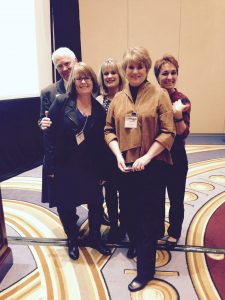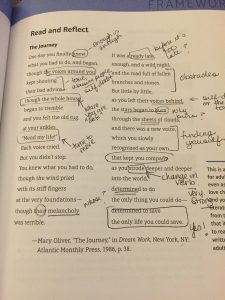This summer I’ve participated in two book study groups. During June, I had the pleasure of studying Teaching Reading with YA Literature: Complex Texts, Complex Lives by Jennifer Buehler with a group of very smart, very thoughtful educators. Starting the end of June and continuing through late August, I’m participating in the Book Love Summer Book Club. We are currently studying Disruptive Thinking: Why How We Read Matters by Kylene Beers and Bob Probst. I have the pleasure of studying with an equally smart and thoughtful group of educators. I love that the conversations have pushed my thinking. It’s caused me to reflect on my practice and the practices in the field. I’ve thought about why we do what we do in the classroom. I’ve thought about how my reading practices have shaped my teaching practices.
I’m a Beers & Probst fangirl. That’s important to note right off the bat. I’ve drunk the Kool-Aid. If they say do it, try it, read it, I will.
 (Front Row: Kylene Beers, Second Row: Glenda Funk, Debbie Greco, Back Row: Bob Probst, Cherylann)
(Front Row: Kylene Beers, Second Row: Glenda Funk, Debbie Greco, Back Row: Bob Probst, Cherylann)
At the beginning of Chapter 7, Beers & Probst have the reader use the poem “The Journey” by Mary Oliver to practice the Book, Head, and Heart framework, so of course I did.
As a former English major and current ELA teacher, I’m fairly adept at close reading, so I prepared to read the poem once, then go back and annotate the poem thinking about the BHH framework. No big deal.
Except it was.
By the time I reached the last line, it was clear I was going to struggle with the Book and Head part of the Book, Head, and Heart framework.
I was going to struggle because I felt like Mary Oliver somehow got into my life over a decade ago, followed me around, and then wrote about it.
Except she couldn’t have because the poem was published 31 years ago.
Two decades or so before my story starts.
Typically speaking my blog is about my journey with YA text, not my personal journey. However, my personal journey and my journey with YA text (in this case pedagogical text) have converged, and so while it’s not a story I’ve shared before, on my blog or anywhere else, it is time to share my post.
10 years ago next month, I started on a journey that was terrifying for me. It was terrifying, but it was something I needed to so. The first step of the journey involved me meeting with a divorce attorney. The second step involved me started a doctoral program at the University of Pennsylvania.
The poem begins “One day you finally knew/what you had to do, and began, though the voices around you/kept shouting/their bad advice”
At this point, the summer of 2007 came rushing back to me.
At that time, I knew I needed to do something about my ex-husband who told me “You can apply, but you’ll never get in” when I asked him if I could apply to graduate school. About my ex-husband who spent months taking cash advances on our credit cards to fund a gambling habit. A habit that had him sitting in a casino on my birthday, while I sat at home. About my ex-husband who blamed his gambling me saying, “You wanted things.” About my ex-husband who blamed his faults on everyone else but him. About my ex-husband who cut me off from my friends and family and didn’t allow me to go anywhere alone. But really, it was about me–a person I know longer knew.
I knew I needed to stop listening to the bad advice. I knew I needed to stop seeing myself the way I was painted to me by my ex-husband. We talk about literature being a window or a mirror. In some ways relationships can be like that. My first marriage had become a mirror–a fun house mirror. The image my husband reflected to me was how he wanted me to see me, not how others really saw me. Like fun house mirrors, this was not a flattering image.
And as the poem continues, “and you felt the old tug/at your ankles./ ‘Mend my life!’/Each voice cried.” I sat through my first meeting with my divorce attorney crying. Crying because I felt weak. I didn’t think I could do it. I didn’t think I was strong enough to walk away. Crying because despite my old life being bad for me, the comfort of “knowing my place” tugged at me. If I left, who was I and what would I do? Crying because I was expected to fix the problem. Crying because I knew that every friendship I had was going to be dragged through the mud as my ex looked for everyone to blame. Crying because I knew he wasn’t going to let me leave—or at least leave easily.
And while “Each voice cried/but [I] didn’t stop./[I] knew what I had to do,” It was time for me to move on. The one thing I knew was exactly what he was going to attempt. He did ask for and get financial support. He did put up a fight about signing papers. He did cause a lot of billable hours to pile up. He did try to smear my name by contacting colleagues. He did paint me as a “hysterical female.” He did threaten to ruin my career. I didn’t expect him to hack into emails. I didn’t expect him to spend time tracking my movements. I didn’t expect to lose an extra 20 lbs (on top of the weight I had already lost trying to please him).
I kept on my course. Despite all of this strife, I found that the other eight members of my doctoral cohort were a huge support. Everything going on in my life meant that my guard was up. It wasn’t easy for them to get to know me beyond what I would let them see. I also finished with very high grades for my first semester, and despite feeling like Penn made a mistake when they admitted me–that voice around me shouting his bad advice was still loud, and I still didn’t feel good enough– I found professors who believed in me and my work. I also learned who my friends were. I am forever grateful for those who sat with me when I needed help going through documents or reached out when they noticed I was “getting a little thin” or dropped me a quick note or stoped into my classroom and asked how I was and understood when I all I could do was cry. There were a lot of unexpected blessings during this time.
“But little by little,/ as [I] left their voices behind,” I moved through the spring. I was figuring out who I was and what I wanted. I wasn’t perfect, but I stopped seeing myself as “broken.” I started to see me as others saw me (at first just glimpses but it was a start), and not as I had been told by my ex to see me.
“And there was a new voice,/which you slowly/recognized as your own/that kept you company/as you strode/ deeper and deeper/into the world…determined to save/the only life you could save.”
Through a lot of hard work, I continue to find my voice. I continue to evolve. I look back to that person I was a decade ago, and I can’t believe I was ever that person.
So when I read this poem, I stopped. I couldn’t believe my life was staring back at me. I couldn’t believe this was the poem chosen for readers to practice the BHH framework.
Reflecting on this framework and this poem, I think back two weeks to when I saw the musical Waitress. The show had a huge impact on me because, despite not being a waitress or expecting a baby, it was like watching the story of my first marriage unfold on the stage in front of me. By the time Jenna sings, “She Used to Be Mine,” I was sitting there in the fourth row with tears streaming down my face.
“She is hard on herself/She is broken and won’t ask for help/She is messy but she’s kind/She is lonely most of the time…It’s not what I asked for/Sometimes life just slips in through a back door/And carves out a person/And makes you believe it’s all true…If I’m honest I know I would give it all back/For a chance to start over/And rewrite an ending or two/For the girl that I knew”
One song reached in and pulled out all those feelings that by the summer of 2007 had come to head. However, I knew by the time Jenna got to this song, she was going to be fine. She had to be. The song ends with “’Til it finally reminds her/To fight just a little/To bring back the fire in her eyes.” And by the summer of 2007, I was finally reminded to fight. I had to fight more than a little, but I knew how to do it. My dad taught me from my youngest days to be tough. If I skinned a knee and came limping and crying and seeking sympathy, Dad would say, “Show me how you used to walk before you hurt your knee.” And my three (or four or five) year-old self would say, “Okay” and go walking away like nothing was wrong. In those most emotional difficult days, I reached down inside and could hear Dad saying, “Show me how you used to walk before you hurt your knee,” and I would give myself another minute more of self-pity, then straighten my shoulders, find my fight, and keep at it. It didn’t mean I wasn’t afraid. It just meant I didn’t give into it. So taking my experiences and seeing myself in Jenna, I knew she was going to reach down inside and find her fight. And of course, at the end of the show she was fine. Earl, maybe not so much, but Jenna was fine.
So I think about the assignment Beers & Probst give at the beginning of the chapter: How does the BHH framework change my reading?
Well, in this case, I was able to make some deep thematic connections to two very different works. I was going to reflect on the most difficult part of my life and think about all I learned. I can pull what I learned from that time with the information from the poem an construct “A Word to the Wiser” Despite making terrible mistakes that have had serious repercussions on one’s life, people are able to move beyond those mistakes if they strength and fight.
I’ve also learned how texts that have deep personal connections also can have deep lasting meaning to the reader. Just as it important to make strong connections with our students in order to build a classroom community and strengthen learning, it is important for students to find strong connections with the text the read in order to strengthen the readers we hope to create in our rooms.





